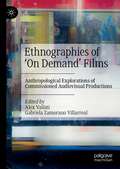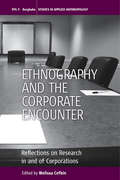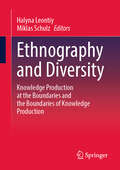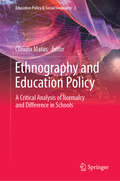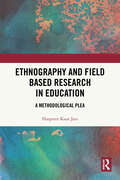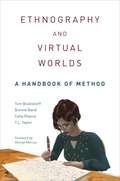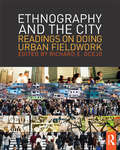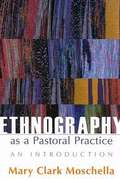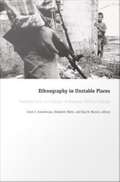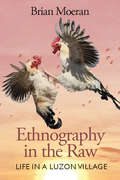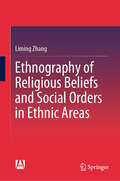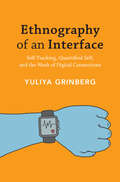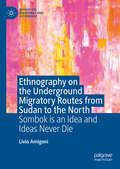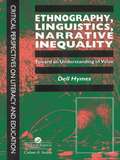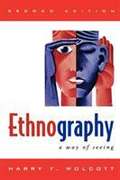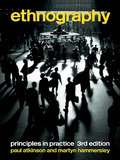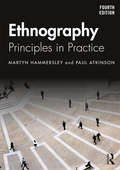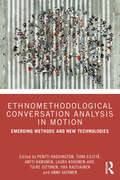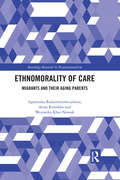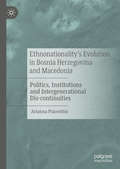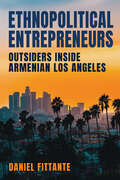- Table View
- List View
Ethnographies of ‘On Demand’ Films: Anthropological Explorations of Commissioned Audiovisual Productions
by Gabriela Zamorano Villarreal Alex VailatiOver the last two decades, the advent of cheap, user-friendly video technologies has contributed to a revolution in representational agency. Videos are now made by production units that are at times composed of families, churches, musical groups, community associations or other institutions. Thus, on-demand videos produced and distributed within local and atypical networks profoundly shape contemporary urban imaginaries. This book explores the intertwined relations among infrastructure, technology, and modernity through an ordinary, yet little studied field of "on-demand" audiovisual production, which involves processes of negotiation and interaction between clients and commissioned video makers. On-demand films are considered as a space of collaboration and self-representation, that allows to reflect on the potential of fiction, artifice, and montage to render material desires, aspirations, and ideas of the future.
Ethnography And The Corporate Encounter
by Melissa CefkinBusinesses and other organizations are increasingly hiring anthropologists and other ethnographically-oriented social scientists as employees, consultants, and advisors. The nature of such work, as described in this volume, raises crucial questions about potential implications to disciplines of critical inquiry such as anthropology. In addressing these issues, the contributors explore how researchers encounter and engage sites of organizational practice in such roles as suppliers of consumer-insight for product design or marketing, or as advisors on work design or business and organizational strategies. The volume contributes to the emerging canon of corporate ethnography, appealing to practitioners who wish to advance their understanding of the practice of corporate ethnography and providing rich material to those interested in new applications of ethnographic work and the ongoing rethinking of the nature of ethnographic praxis.
Ethnography and Diversity: Knowledge Production at the Boundaries and the Boundaries of Knowledge Production
by Halyna Leontiy Miklas SchulzThe focus of the volume is on ethnographically oriented research practice. It is reflected in the mirror of the currently controversial concepts of diversity and intersectionality in the cultural and social sciences. Special attention is paid to the question of how researchers deal with the methodological problem of the production, reproduction and reflection of categories. Which categories are already brought to the 'field', later revised or solidified, and which categories finally accompany the interpretation process and which constitute the presentation of results? How and why do they emerge? And last but not least: How are specific worlds of experience of human diversity co-produced or transformed by (research) categories? The Content Conceptual foundations - Diversity and inclusion in educational contexts - Interculture in diversity - Diversity in the field of tension between body, gender and disability The Editors Dr. rer. soc. Halyna Leontiy is Substitute Professor (Verwaltungsprofessorin) of Foundations of Social Sciences, Institute of Methods and Methodological Principles in the Social Sciences (IMMS), University of Goettingen, Germany since October 2021. Prof. Dr. phil. Miklas Schulz is a visiting researcher focusing on Inclusive Education and School Development at the Institute of Educational Science, Department of Applied Educational Science, at the University of Hildesheim.
Ethnography and Education Policy: A Critical Analysis of Normalcy and Difference in Schools (Education Policy & Social Inequality #3)
by Claudia MatusThis book addresses the relationship between the production of social problems in educational policy, the research practices required to inform policy, and the daily production of normalcies and differences in school contexts. It reports on the opportunities and consequences for policy, research, and practice when normalcy is stigmatized at the same level as difference. The book employs a critical analysis combining queer, feminist, and post-representational theories to understand the implications of dominant ways of understanding the division between normal and different subjectivities and how they reiterate structures of inequality in schools.
Ethnography and Field Based Research in Education: A Methodological Plea
by Harpreet Kaur JassThis book explores the interlinkages between education and ethnography within the Indian context. It looks at the key role ethnography can play in understanding the fundamental issues within the discipline of education.It examines the complexities of undertaking ethnographic research in the field of education and pedagogy—from conceptualising to analysis and the final phase of writing your research. The volume discusses ethnography as an assistive tool, a method, and a research design to present the issues of educational debates on its disciplinary status and identifiable areas of study. The chapters weave a relevant premise to study what happens in schools from different vantage points such as psychology, anthropology, philosophy, and sociology. In a scenario where only a few works have used ethnography as a primary methodology to explore the nuances in education, this book discusses ethnographic methods and explains how it is conducted. The book also offers unique methods to analyse and write ethnographic data.The book will be of interest to students, researchers, and teachers of departments of education, anthropology, sociology of education, urban education, politics of education, and teacher education institutions. It will also be useful for education policymakers, educationalists, and education professionals.
Ethnography and Virtual Worlds: A Handbook of Method
by Tom Boellstorff Celia Pearce Bonnie Nardi T. L. TaylorA practical guide to the ethnographic study of online virtual worldsEthnography and Virtual Worlds is the only book of its kind—a concise, comprehensive, and practical guide for students, teachers, designers, and scholars interested in using ethnographic methods to study online virtual worlds, including both game and nongame environments. Written by leading ethnographers of virtual worlds, and focusing on the key method of participant observation, the book provides invaluable advice, tips, guidelines, and principles to aid researchers through every stage of a project, from choosing an online fieldsite to writing and publishing the results.Provides practical and detailed techniques for ethnographic research customized to reflect the specific issues of online virtual worlds, both game and nongameDraws on research in a range of virtual worlds, including Everquest, Second Life, There.com, and World of WarcraftProvides suggestions for dealing with institutional review boards, human subjects protocols, and ethical issuesGuides the reader through the full trajectory of ethnographic research, from research design to data collection, data analysis, and writing up and publishing research resultsAddresses myths and misunderstandings about ethnographic research, and argues for the scientific value of ethnography
Ethnography and Virtual Worlds: A Handbook of Method, Updated Edition
by Tom Boellstorff Celia Pearce Bonnie Nardi T. L. TaylorA practical guide to the ethnographic study of online cultures, and beyondEthnography and Virtual Worlds is the only book of its kind—a concise, comprehensive, and practical guide for students, teachers, designers, and scholars interested in using ethnographic methods to study online virtual worlds, including both game and nongame environments. Written by leading ethnographers of virtual worlds, and focusing on the key method of participant observation, the book provides invaluable advice, tips, guidelines, and principles to aid researchers through every stage of a project, from choosing an online fieldsite to writing and publishing the results.Provides practical and detailed techniques for ethnographic research customized to reflect the specific issues of online virtual worlds, both game and nongameDraws on research in a range of virtual worlds, including Everquest, Second Life, There.com, and World of WarcraftProvides suggestions for dealing with institutional review boards, human subjects protocols, and ethical issuesGuides the reader through the full trajectory of ethnographic research, from research design to data collection, data analysis, and writing up and publishing research resultsAddresses myths and misunderstandings about ethnographic research, and argues for the scientific value of ethnography
Ethnography and the City: Readings on Doing Urban Fieldwork (The Metropolis and Modern Life)
by Richard E. OcejoThe only collection of its kind on the market, this reader gathers the work of some of the most esteemed urban ethnographers in sociology and anthropology. Broken down into sections that cover key aspects of ethnographic research, Ethnography and the City will expose readers to important works in the field, while also guiding students to the study of method as they embark on their own work.
Ethnography as a Pastoral Practice: An Introduction
by Mary Clark MoschellaEthnography is a way to tap the deep undercurrents in a community through a process of gathering, analyzing, and sharing data. The author informs clergy on how they can use it to give themselves ears to hear their members' own stories, deep wisdom, and longing for God. The uniqueness of her work lies in its ability to galvanize aspirations and heal communal hurt. She lays out the helpful pastoral practice of ethnography in a clear, step-by-step manner and includes many compelling case studies of transformational leadership.
Ethnography in Organizations (Qualitative Research Methods, Volume #27)
by Helen B. SchwartzmanWritten in a clear, easy-to-follow style, Ethnography in Organizations evaluates the wide range of ethnographic research that has been-- and continues to be-- conducted in organizations. Beginning with the classic definition of bureaucracy and rational organization presented by Max Weber, author Helen B. Schwartzman analyzes three main paradigms-- functional studies, structural analyses, and interpretive research. Using the Hawthorne Study as a starting point, this useful volume explores such topics as the roles and methods used by organizational ethnographers, the problems and prospects for conducting fieldwork in organizations, the "incorporation" of American life, and the role that everyday, but often overlooked, routines play in the production and reproduction of organizations, institutions, and society. Replete with vivid examples taken from both public and private sector settings, Ethnography in Organizations is a must for anyone conducting research in an organizational setting.
Ethnography in Unstable Places: Everyday Lives in Contexts of Dramatic Political Change
by Carol J. Greenhouse Elizabeth Mertz Kay B. WarrenEthnography in Unstable Places is a collection of ethnographic accounts of everyday situations in places undergoing dramatic political transformation. Offering vivid case studies that range from the Middle East and Africa to Europe, Russia, and Southeast Asia, the contributing anthropologists narrate particular circumstances of social and political transformation--in contexts of colonialism, war and its aftermath, social movements, and post-Cold War climates--from the standpoints of ordinary people caught up in and having to cope with the collapse or reconfiguration of the states in which they live. Using grounded ethnographic detail to explore the challenges to the anthropological imagination that are posed by modern uncertainties, the contributors confront the ambiguities and paradoxes that exist across the spectrum of human cultures and geographies. The collection is framed by introductory and concluding chapters that highlight different dimensions of the book's interrelated themes--agency and ethnographic reflexivity, identity and ethics, and the inseparability of political economy and interpretivism. Ethnography in Unstable Places will interest students and specialists in social anthropology, sociology, political science, international relations, and cultural studies. Contributors. Eve Darian-Smith, Howard J. De Nike, Elizabeth Faier, James M. Freeman, Robert T. Gordon, Carol J. Greenhouse, Nguyen Dinh Huu, Carroll McC. Lewin, Elizabeth Mertz, Philip C. Parnell, Nancy Ries, Judy Rosenthal, Kay B. Warren, Stacia E. Zabusky
Ethnography in the Raw: Life in a Luzon Village
by Brian MoeranEthnography in the Raw describes the author’s encounters with the Philippine family into which he has married, his wife’s friends and acquaintances, and their lives in a remote rural village in the rice basin of Luzon, about 130 miles northeast of Manila. The book links detailed descriptions of his Philippine family with cultural practices such as circumcision, marriage and cockfights combined with theoretical musings on the concepts of sacrifice, social exchange, patron-client relations, food, and religious symbolism. It is both anthropological fieldwork ‘in the raw,’ and an incisive analysis of contemporary Philippine society and culture.
Ethnography in the Raw: Life in a Luzon Village
by Brian MoeranEthnography in the Raw describes the author’s encounters with the Philippine family into which he has married, his wife’s friends and acquaintances, and their lives in a remote rural village in the rice basin of Luzon, about 130 miles northeast of Manila. The book links detailed descriptions of his Philippine family with cultural practices such as circumcision, marriage and cockfights combined with theoretical musings on the concepts of sacrifice, social exchange, patron-client relations, food, and religious symbolism. It is both anthropological fieldwork ‘in the raw,’ and an incisive analysis of contemporary Philippine society and culture.
Ethnography of Religious Beliefs and Social Orders in Ethnic Areas
by Liming ZhangThis book presents a fascinating study of the religion of minority groups living in rural areas in Yunnan province in the early twenty-first century and how they use religious rituals to show their own nationality and spiritual culture. By exploring these minority groups, e.g., the Dai, Bulang, and De’ang, the book makes a major contribution to our understanding of the relationship between religion and social functions and of the ways in which globalization and modernity are experienced at the most personal level. It provides valuable insights into how minority people negotiate sacred /secular demands and requirements, how they experience a sense of satisfaction and comfort in Buddhist temples, and how that experience shapes their sense of identity, worldview, values, and relations with others. In closing, the book gives a voice to the experiences of Buddhists, who are one of the most important—and yet least visible—signs of religion freedom in China’s reform processes. It offers a unique guide for all readers, who are interesting in oriental studies, and an ideal reference book for Anthropology and Buddhism courses at colleges and universities.
Ethnography of an Interface: Self-Tracking, Quantified Self, and the Work of Digital Connections
by Yuliya GrinbergTechnologists frequently promote self-tracking devices as objective tools. This book argues that such glib and often worrying assertions must be placed in the context of precarious industry dynamics. The author draws on several years of ethnographic fieldwork with developers of self-tracking applications and wearable devices in New York City's Silicon Alley and with technologists who participate in the international forum called the Quantified Self to illuminate the professional compromises that shape digital technology and the gap between the tech sector's public claims and its interior processes. By reconciling the business conventions, compromises, shifting labor practices, and growing employment insecurity that power the self-tracking market with device makers' often simplistic promotional claims, the book offers an understanding of the impact that technologists exert on digital discourse, on the tools they make, and on the data that these gadgets put out into the world.
Ethnography on the Underground Migratory Routes from Sudan to the North: Sombok Is an Idea and Ideas Never Die (Migration, Diasporas and Citizenship)
by Livio AmigoniThis book uses an ethnography of the migratory route from Sudan to the EU to understand how undocumented migration experiences take place and breed underground forms of mobilities and survival strategies. It pays particular attention to the production, circulation and resilience of migratory knowledge in transnational networks and how those produce and sustain specific mobility practices. The related research questions focus on: how and which narratives and popular imaginations circulate and foster high-risk journeys towards Europe, referred to as sombok; understanding how these kind of journeys are interpreted and framed according to gender, religion and family traditions; discerning how border regimes produce specific migration careers, decision making processes and forms of resistance and cooperation with other actors; how the figure of the smuggler is framed by people on the move and how one group of smugglers interpret their activities at the Ventimiglia border; and how the practices of homing on the move and solidarity housing experiences take place and prop underground routes. This book will be of interest to scholars of migration.
Ethnography, Linguistics, Narrative Inequality: Toward An Understanding Of Voice
by Dell HymesThis collection of work addresses the contribution that ethnography and linguistics make to education, and the contribution that research in education makes to anthropology and linguistics.; The first section of the book pinpoints characteristics of anthropology that most make a difference to research in education. The second section describes the perspective that is needed if the study of language is to contribute adequately to problems of education and inequality. Finally, the third section takes up discoveries about narrative, which show that young people's narratives may have a depth of form and skill that has gone largely unrecognized.
Ethnography: A Theoretically Oriented Practice
by Vincenzo Matera Angela BiscaldiThis volume presents both a historical exploration of ethnography and a thematic discussion of major trends that, over different periods, have oriented and re-oriented research practice. As it overviews ethnography from different geographic and thematic perspectives, it further explores new lines of ethnographic research, including as feminist ethnography and visual research, that uncover non-traditional routes to anthropological knowledge.As the great ethnographer E. E. Evans-Pritchard wrote, “Anyone who is not a complete idiot can do fieldwork… but will [his contribution] be to theoretical, or just to factual knowledge?” As Evans-Pritchard highlights and as this book argues, successful ethnography must be connected to a sophisticated theoretical reflection rooted in social and cultural anthropology.
Ethnography: A Way Of Seeing
by Harry F. WolcottOne of anthropology's leading writers on ethnographic methods, Harry Wolcott discusses the fundamental nature of ethnographic studies. <P><P>Tracing its development from its disciplinary origins in sociology and anthropology, he points out what is distinctive about ethnography and what it means to conduct research in the ethnographic tradition. <P><P>In this engaging and thought-provoking book, Wolcott distinguishes ethnography as more than just a set of field methods and practices, separating it from many related qualitative research traditions as 'a way of seeing' through the lens of culture. <P><P>For both beginning and experienced ethnographers in a wide range of disciplines, Wolcott's book will provide important ideas for improving research practice.
Ethnography: Principles in Practice
by Paul Atkinson Martyn HammersleyNow in its third edition, this leading introduction to ethnography has been thoroughly updated and substantially rewritten. It offers a systematic introduction to ethnographic principles and practice. New material covers the use of visual and virtual research methods, hypermedia software and the issue of ethical regulation. There is also a new prologue and epilogue. The authors argue that ethnography is best understood as a reflexive process. What this means is that we must recognize that social research is part of the world that it studies. From an outline of the principle of reflexivity the authors go on to discuss and exemplify main features of ethnographic work, including: the selection and sampling of cases the problems of access observation and interviewing recording and filing data the process of data analysis and writing research reports. Throughout, the discussion draws on a wide range of illustrative material from classic and more recent studies within a global context. The new edition of this popular textbook will be an indispensable resource for students and researchers utilizing social research methods in the social sciences and cultural studies.
Ethnography: Principles in Practice
by Paul Atkinson Martyn HammersleyNow in its fourth edition, this leading introduction to ethnography has been thoroughly updated and substantially rewritten. The volume offers a systematic introduction to ethnographic principles and practice, and includes a new chapter on ‘Ethnography in the digital world’. The authors argue that ethnography is best understood as a reflexive process. This requires recognition that social research is part of the world that it studies, and demands that researchers reflect on how they shape both data and analysis. Starting in Chapter 1 with an outline of the principle of reflexivity, against the background of competing research philosophies, the authors go on to discuss the main features of ethnographic work, including: the selection and sampling of cases the problem of access field relations and observation interviewing the use of documents recording and organizing data the process of data analysis and writing research reports. There is also consideration of the ethical issues involved in ethnographic research. Throughout, the discussion draws on a wide range of illustrative material from classic and more recent studies, within a global context. The new edition of this popular textbook will be an indispensable resource for undergraduate and postgraduate students, and for all researchers using ethnographic methods in the social sciences and the humanities.
Ethnomethodological Conversation Analysis in Motion: Emerging Methods and New Technologies
by Pentti Haddington, Tiina Eilittä, Antti Kamunen, Laura Kohonen-Aho, Tuire Oittinen, Iira Rautiainen and Anna VatanenThis volume discusses current and emerging trends in Ethnomethodological Conversation Analysis (EMCA). Focusing on step-by-step procedures of talk and interaction in real time, EMCA explores how people – through locally-produced, public, and common-sensical practices – accomplish activities together and thereby make sense and create social order as part of their everyday lives. The volume is divided into four parts, and it provides a timely methodological contribution by exploring new questions, settings, and recording technologies in EMCA for the study of social interaction. It addresses the methodical diversity in EMCA, including current practices as well as those testing its boundaries, and paves way for the development of future interaction research. At the same time, the book offers readers a glimpse into the ways in which human and non-human participants operate with each other and make sense of the world around them. The authors represent diverse fields of research, such as language studies, sociology, social psychology, human-computer interaction, and cognitive science. Ultimately, the book is a conversation opener that invites critical and constructive dialogue on how EMCA’s methodology and toolbox could be developed for the purpose of acquiring richer perspectives on endogenous social action. This is key reading for researchers and advanced students on a range of courses on conversation analysis, language in interaction, discourse studies, multimodality and more.
Ethnomorality of Care: Migrants and their Aging Parents (Routledge Research in Transnationalism)
by Agnieszka Radziwinowiczówna Anna Rosińska Weronika Kloc-NowakWhat happens when the parents of migrants age and need care in mobile and aging societies? Ethnomorality of Care acts as a window in sharing how physical distance challenges family-centered elderly care by juxtaposing transnational families with non-migrant families. <P><P>A novel approach that explores intentions and moral beliefs concerning elderly care alongside practical care arrangements, Ethnomorality of Care presents a concept of care which recognizes how various factors shape the experience of care, including: national, regional, and local contexts, economic inequalities, gender, care and migration regimes. Based on the findings of a multi-sited research carried out between 2014 and 2017 in Poland and the UK, this perceptive volume also seeks to demonstrate how researchers and practitioners can use ethnomorality of care approach to examine non-migrant families and other types of care. <P><P>Helping readers to better understand the lived experience of care receivers and givers beyond kinship care, Ethnomorality of Care will appeal to graduate students, researchers, policy makers and care practitioners interested in fields such as migration studies, transnational studies and social and cultural gerontology.
Ethnonationality’s Evolution in Bosnia Herzegovina and Macedonia: Politics, Institutions and Intergenerational Dis-continuities
by Arianna PiacentiniThis book is centred upon the concept of ‘ethnonationality,’ investigating how its meanings and functions have changed across political regimes, time, and generations. Piacentini explores two similar yet different realities, Bosnia Herzegovina and Macedonia (now North Macedonia) – both former Yugoslav republics, multiethnic, and currently characterised by consociational arrangements and ethnic politics. This temporal perspective encompasses both the Yugoslav and post-Yugoslav period, empirically exploring two generations living together in the same family, each socialised by different macro-environments and socio-political and economic conditions. The book explores which ideas, rules, and patterns of behaviour related to ethnonationality have been transmitted between the generations. Ethnonationality’s Evolution in Bosnia Herzegovina and Macedonia will be of interest to students and scholars across a range of disciplines, including sociology, politics, and conflict studies.
Ethnopolitical Entrepreneurs: Outsiders inside Armenian Los Angeles
by Daniel FittanteEthnopolitical Entrepreneurs presents the story of the Armenians of Glendale, California. Coming from Argentina, Armenia, Egypt, Iran, Jordan, Lebanon, Russia, Syria, and many other countries, this group is internally fragmented and often has limited experience with the American political system. Nonetheless, Glendale's Armenians have rapidly mobilized and remade an American suburban space in their own likeness. In telling their story, Daniel Fittante expands our understanding of US political history. From the late nineteenth-century onward, Irish, Italian, Jewish, and several other immigrant populations in large American cities began changing the country's political reality. The author shows how Glendale's Armenians—as well as many other immigrants—are now changing the country's political reality within its dynamic, multiethnic suburbs. The processes look different in various suburban contexts, but the underlying narrative holds: immigrant populations converge on suburban areas and ambitious political actors develop careers by driving coethnics' political incorporation.
